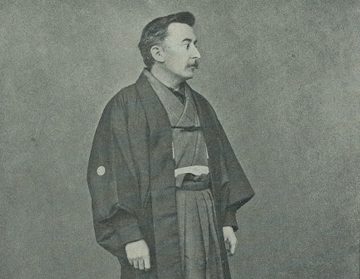Andrei Codrescu at The Paris Review:
 At the end of the nineteenth century, Lafcadio Hearn was one of America’s best-known writers, one of a stellar company that included Mark Twain, Edgar Allan Poe, and Robert Louis Stevenson. Twain, Poe, and Stevenson have entered the established literary canon and are still read for duty and pleasure. Lafcadio Hearn has been forgotten, with two remarkable exceptions: in Louisiana and in Japan. Yet Hearn’s place in the canon is significant for many reasons, not least of which is how the twentieth century came to view the nineteenth. This view, both academic and popular, reflects the triumph of a certain futuristic Modernism over the mysteries of religion, folklore, and what was once called “folk wisdom.” To witness this phenomenon in time-lapse, sped-up motion, one need only consider Lafcadio Hearn, the Greek-born, Irish-raised, New World immigrant who metamorphosed from a celebrated fin-de-siècle American writer into the beloved Japanese cultural icon Koizumi Yakumo in less than a decade, in roughly the same time that Japan changed from a millennia-old feudal society into a great industrial power.
At the end of the nineteenth century, Lafcadio Hearn was one of America’s best-known writers, one of a stellar company that included Mark Twain, Edgar Allan Poe, and Robert Louis Stevenson. Twain, Poe, and Stevenson have entered the established literary canon and are still read for duty and pleasure. Lafcadio Hearn has been forgotten, with two remarkable exceptions: in Louisiana and in Japan. Yet Hearn’s place in the canon is significant for many reasons, not least of which is how the twentieth century came to view the nineteenth. This view, both academic and popular, reflects the triumph of a certain futuristic Modernism over the mysteries of religion, folklore, and what was once called “folk wisdom.” To witness this phenomenon in time-lapse, sped-up motion, one need only consider Lafcadio Hearn, the Greek-born, Irish-raised, New World immigrant who metamorphosed from a celebrated fin-de-siècle American writer into the beloved Japanese cultural icon Koizumi Yakumo in less than a decade, in roughly the same time that Japan changed from a millennia-old feudal society into a great industrial power.
more here.
